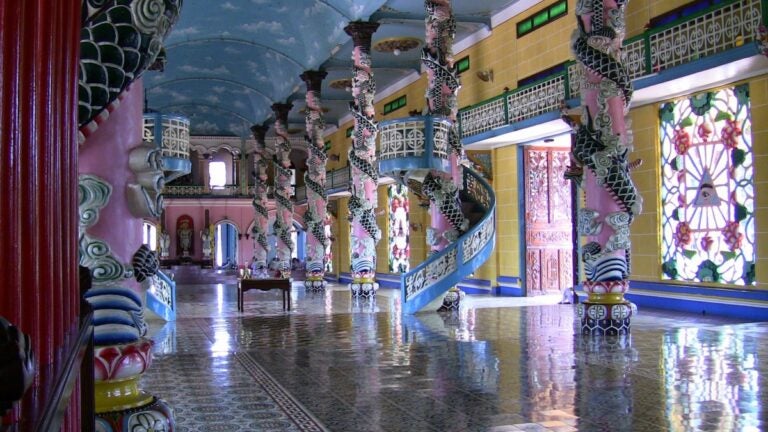The emerging importance of Transpacific connections has forced us to re-calibrate our bearings and re-examine the established binaries of East and West, Orientalism and Occidentalism. In the age of air travel, we head to the west from North America in order to end up in the east. Besides scrambling familiar geographical coordinates, the rise of many Asian countries is also disturbing even the newer polarities of the global North and global South. This conference seeks to explore how ideas of religion and spirituality have been re-oriented in the 21st century, and to document the new combinations that have emerged.
A new concept of Transpacific religion and spirituality looks at ways in which many new religious and spiritual phenomenon are simultaneously produced on both sides of the Pacific, through a form of dialogue which is both cosmopolitan and localized. We will look at groups which define themselves as “religions” as well as those that prefer to be called “spiritualities”, and focus on the ways in which the categories of the spiritual and the secular are constructed through an interactive process that moves between the two sides of the world’s largest ocean .
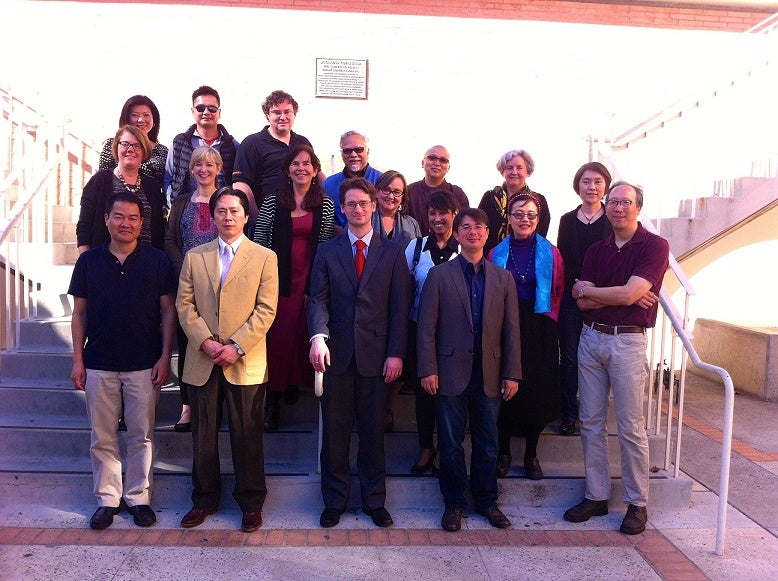
Front row: Michael Matsatugu, Michiro Ama, Levi McLaughlin, Duncan Williams, Lon Kurashige
Second row: Allison Truitt, Lori Meeks, Janet Hoskins, Nancy Stalker, Deirdre De la Cruz, Mayfair Yang, Tomoe Moriya
Back row: Julia Huang, Jonathan Lee, Alexander Soucy, Prasenjit Duara, Rongdao Lai, Jean De Bernardi
Not pictured: Nile Green, Vinay Lal.
Keynote Address
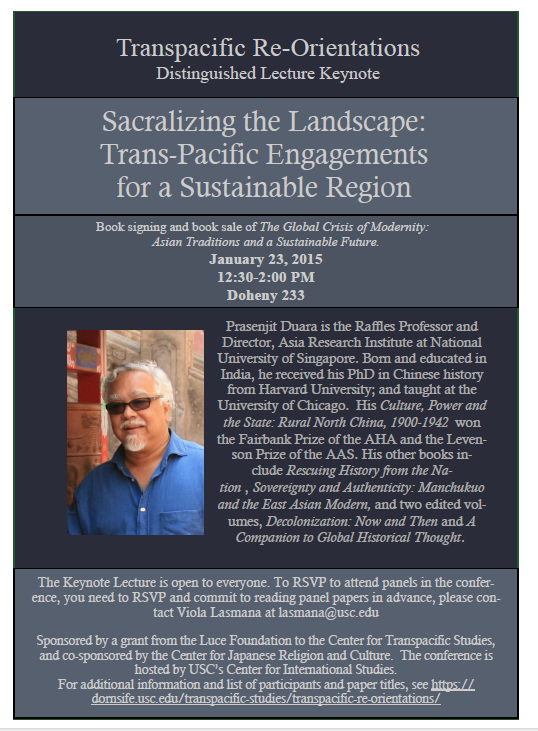
Program Information
Friday and Saturday, January 23-24 2015
Sponsored by a grant from the Luce Foundation to the Center for Transpacific Studies, and co-sponsored by the Center for Japanese Religion and Culture. The conference is hosted by USC’s Center for International Studies.
-
8:30-9:00am Coffee and Registration
9:00-9:15am Opening Remarks: Janet Hoskins, Duncan Williams
9:15-11:15am Panel 1 Transpacific Perspectives: Broad Comparisons
Janet Hoskins
Religious Re-Orientations: Transpacific Perspectives on “Asian Religions”
Alexander Soucy
The Problem of Calling Transnational Buddhism “Ethnic”
Nile Green
Founding the First Mosques in America and Japan: Transpacific Comparisons
Discussant: Lon Kurashige, History, USC
11:30am-12:30 pm Luncheon
Buffet on the outside patio adjoining SOS B40
12:30-2:00 pm Keynote Address — Doheny Library 233
Prasenjit Duara
Sacralizing the Landscape: Trans-Pacific Engagements for a Sustainable Region
There will be a book sale at the back of Doheny room DML 240 where the keynote address is held.
2:15-3:45 pm Panel 2 Revisiting Late 19th/Early 20th Asian Religious Leaders in a Transpacific Frame
Vinay Lal
The Global Iconicity of Vivekananda and Transpacific Hinduism
Tomoe Moriya
Japanese Zen in LaSalle, Illinois: The Young D.T. Suzuki and His Encounter with Early 20th Century America
Rongdao Lai
Transmission without Succession: The Transnational Tiantai Network in Twentieth-Century Chinese Buddhism
Discussant: Duncan Williams
3:45-4:00 pm Coffee Break
4:00-6:00 pm Panel 3 Moving Gods: Relocations of the Sacred Across Oceans
Jean DeBernardi
The Modernization of Chinese Taoism
Allison Truitt
Transpacific Crossings: Quan Thế Âm and Journeys to the Pure Land
Jonathan H.X. Lee
Locating Locality in Transnational Religiosity: The Case of Chinese/Taiwanese Women and the Tianhou/Mazu Empress of Heaven Cult
C. Julia Huang
Transpacific Bodhisattvas: Interacting Bipolar, Diasporic Circulations, and a New “Asian” Spirituality through Buddhist Charity
Discussant: Mayfair Yang
6 pm End of Day 1 – Break until Dinner
7:30pm Conference Dinner (restaurant TBA)
-
9:30-10am Coffee and Registration
10-Noon Panel 4 Japanese American Buddhism: A Transpacific Exchange
Duncan Williams
‘Onward Buddhist Soldiers’: Japanese American Nisei Buddhist Soldiers in the Pacific Theater
Michael Masatsugu
Continuous Flow of Gratitude: Buddhist Japanese American Pilgrimages after World War II
Michihiro Ama
Transpacific Postwar Developments of Shin Buddhism
Jane Iwamura
Whither Japan?: Buddhist Echoes in Contemporary Japanese American Life and Culture
Discussant: Tomoe Moriya
Noon-1:30pm Lunch
1:30-3:00PM Panel 5 Cultural/Educational Strategies among Newer Religious Networks
Nancy Stalker
Cultural Connections: Traditional Arts As Entrée to Japanese New Religious Movements
Levi McLaughlin
Educational Aspiration as Religious Practice in Sōka Gakkai: Case Studies of Pedagogy and Institution-Building in Japan and the United States
Deirdre de la Cruz
Genealogies of the Filipino New Age
Discussant: Lori Meeks
3:00-3:15 pm Coffee Break
3:15-4:30 pm Group Discussion/Conference Closing
Speakers
Prasenjit Duara (Keynote Address)
Titles: Sacralizing the Landscape: Trans-Pacific Engagements for a Sustainable Region
Bio:
Prasenjit Duara is the Raffles Professor of Humanities and Director, Asia Research Institute at National University of Singapore. He was born and educated in India; received his PhD in Chinese history from Harvard University; and was previously Professor and Chair of the Dept of History and Chair of the Committee on Chinese Studies at the University of Chicago. In 1988, he published Culture, Power and the State: Rural North China, 1900-1942(Stanford Univ Press), which won the Fairbank Prize of the AHA and the Levenson Prize of the AAS, USA. Among his other books are Rescuing History from the Nation (U Chicago 1995), Sovereignty and Authenticity: Manchukuo and the East Asian Modern (Rowman 2003), an edited volume, Decolonization: Now and Then (Routledge, 2004) and A Companion to Global Historical Thought co-edited with Viren Murthy and Andrew Sartori (John Wiley, 2014). His work has been widely translated into Chinese, Japanese, Korean and the European languages.
His new book, The Crisis of Global Modernity: Asian Traditions and a Sustainable Future will be published by Cambridge University Press in December 2014.
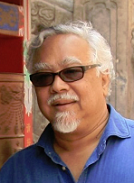
Michihiro Ama
Titles: Transpacific Postwar Developments of Shin Buddhism
Bio:
Michihiro Ama is Assistant Professor of Japanese at the University of Alaska, Anchorage. He specializes in the study of modern Japanese Buddhism. His research interests include: Buddhism and Transnationalism; Buddhism in Literature and Film; Buddhism, Gender and Ethnicity; and Buddhism and Language. He is the author of Immigrants to the Pure Land: The Modernization, Acculturation, and Globalization of Shin Buddhism, 1898-1941 (University of Hawai‘i Press, 2011). He is also guest editor for the special issue on “Natsume Sōseki and Buddhism” in The Eastern Buddhist 38 (2007). Ama is currently working on a book project, The Awakening of Fiction: Literature and Buddhism in Modern Japan.
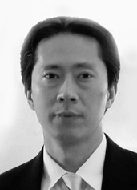
Jean DeBernardi
Titles: Tea and Chinese Spiritual Culture East and West
Bio:
Jean DeBernardi is Professor of Anthropology at the University of Alberta. She received her training as a cultural anthropologist at Stanford University, Oxford University, and the University of Chicago and has been teaching in Canada since 1991. She has published two books based on ethnographic and archival research focused on Chinese in Malaysia, Rites of Belonging: Memory, Modernity and Identity in a Malaysian Chinese Community (Stanford University Press, 2004), and The Way that Lives in the Heart: Chinese Popular Religion and Spirit Mediums in Penang, Malaysia (Stanford University Press, 2006), which NUS Press reprinted (2009, 2011). She recently completed a study on religious and cultural pilgrimage to the Daoist temple complex at Wudang Mountain, South-central China. While studying this UNESCO World Heritage Site, she discovered that local tea growers marketed their teas as “Daoist tea,” and in 2009 launched a new project exploring contemporary tea culture in China. She and her graduate students have been conducting research in Fujian, Zhejiang, and Jiangsu Provinces with support from the Chiang Ching-kuo Foundation (2010-2012) and the Social Science and Humanities Research Council of Canada (2012-2015). They have also explored the introduction of contemporary Chinese tea culture in North America.
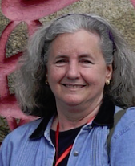
Deirdre de la Cruz
Titles: Genealogies of the Filipino New Age
Bio:
Deirdre de la Cruz (Ph.D. in Cultural Anthropology, Columbia University) is Assistant Professor in the Department of Asian Languages and Cultures and the Department of History at the University of Michigan. Her first book (forthcoming with the University of Chicago Press) is a historical and ethnographic examination of several apparitions of the Virgin Mary in the Philippines from the mid nineteenth century to the present, especially as they articulate with projects and practices of colonial and post-colonial modernity. In addition to Philippine history and ethnography, her research interests include theories of religion, colonialism and post-colonialism, visual culture, histories and theories of the mass media, and global occultisms.
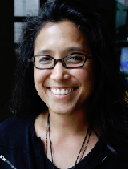
Nile Green
Titles: Founding the First Mosques in America and Japan: Transpacific Comparisons
Bio:
Nile Green is Professor of History at UCLA and founding Director of the UCLA Program on Central Asia. He is the author of six monographs, including Bombay Islam: The Religious Economy of the West Indian Ocean (Cambridge, 2011), which won the Middle East Studies Association’s Albert Hourani award and the Association for Asian Studies’ Ananda K. Coomaraswamy award. His newest book is Terrains of Exchange: Religious Economies of Global Islam (Oxford, 2015), which traces the rise of new Muslim religious entrepreneurs operating from the Middle East through India and on to Europe, the United States and Japan.He has travelled and researched among Muslim communities in around twenty countries, from India, Pakistan, Afghanistan and Iran to Morocco, Syria, Yemen, Japan, China and most recently Myanmar. His work brings Islamic history into conversation with global history.

Janet Hoskins
Titles: Religious Re-Orientations: Transpacific Perspectives on “Asian Religions”
Bio:
Janet Hoskins is Professor of Anthropology and Religion at the University of Southern California, Los Angeles. Her books include The Divine Eye and the Diaspora: Vietnamese Syncretism Becomes Transpacific Caodaism (2015), The Play of Time: Kodi Perspectives on History, Calendars and Exchange (1996 Benda Prize in Southeast Asian Studies), and Biographical Objects: How Things Tell the Stories of People’s Lives (1998). She has edited four books, including Transpacific Studies: Framing an Emerging Field (2014, with Viet Thanh Nguyen). She served as President of the Society for the Anthropology of Religion from 2011-13, and has produced three ethnographic documentaries (distributed by www.der.org), including “The Left Eye of God”.
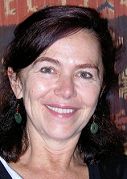
C. Julia Huang
Titles: Transpacific Bodhisattvas: Interacting Bipolar, Diasporic Circulations, and a New “Asian” Spirituality through Buddhist Charity
Bio:
Dr. C. Julia Huang is a Professor of Anthropology at National Tsing Hua University, Taiwan, and currently a visiting scholar at the Ho Center for Buddhist Studies at Stanford University. Her book, Charisma and Compassion: Cheng Yen and the Buddhist Tzu Chi Movement (Harvard University Press, 2009) is an ethnography that examines the charitable movement Compassionate Relief’s organization and charismatic leadership, its relationship with NGOs, and the nature of its Buddhist transnationalism between Taiwan and overseas branches. She has recently completed a book manuscript, The Social Life of Goodness: Religious Philanthropy in Chinese Studies (co-authored with Robert P. Weller and Keping Wu).
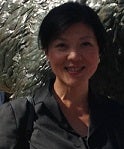
Jane Iwamura
Titles: Whither Japan?: Buddhist Echoes in Contemporary Japanese American Life and Culture
Bio:
Jane Naomi Iwamura is Associate Professor and Chair of the Religious Studies department at the University of the West. Dr. Iwamura’s research focuses on Asian American religions, race and popular culture in the United States (with an emphasis on visual culture). Her publications include Virtual Orientalism: Religion and Popular Culture in the U.S. (Oxford 2011) and the co-edited volume, Revealing the Sacred in Asian and Pacific America (Routledge 2003). She has also written on Japanese American lived religions, as well as the intersection of religion and Asian American literary production.
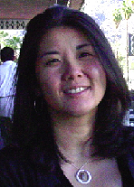
Rongdao Lai
Titles: Transmission without Succession: The Transnational Tiantai Network in Twentieth-Century Chinese Buddhism.
Bio:
Rongdao Lai is Assistant Professor of Religion at the University of Southern California. She received her PhD in Religious Studies from McGill University in 2013. She specializes in modern Chinese Religions, focusing especially on the changing landscape in modern Chinese Buddhism and identity production. She is guest-editor for the Eastern Buddhist feature on Socially Engaged Buddhism (2013). She is currently working on a book manuscript based on her doctoral dissertation on modern Buddhist education in China. Her other on-going project focuses on the networks and transnational movements of Chinese Buddhists in the twentieth century.
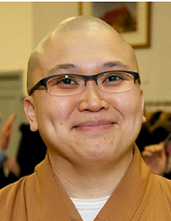
Vinay Lal
Titles: The Global Iconicity of Vivekananda and Transpacific Hinduism
Bio:
Vinay Lal is Professor of History at UCLA. He earned his Ph.D. with Distinction from the University of Chicago in 1992 after undergraduate and Masters degrees in literature and philosophy from Johns Hopkins University. He writes widely on Indian history, historiography, public and popular culture in India, the Indian diaspora, colonialism, Gandhi and the architecture of nonviolence, and the global politics of knowledge systems. His fourteen books include the two-volume Oxford Anthology of the Modern Indian City (Oxford, 2013); Deewaar: The Footpath, the City, and the Angry Young Man (HarperCollins, 2011); Political Hinduism: The Religious Imagination in Public Spheres (ed., Oxford, 2009); The Future of Knowledge and Culture: A Dictionary for the Twenty-first Century, co-edited with Ashis Nandy (Viking Penuin, 2005); Of Cricket, Guinness and Gandhi: Essays on Indian History and Culture (Penguin, 2005); The History of History: Politics and Scholarship in Modern India (Oxford, 2003); and Empire of Knowledge: Culture and Plurality in the Global Economy (Pluto Press, 2002). He is now finishing two books on Gandhi and a manuscript on Internet Hinduism. His work has been translated into Hindi, Urdu, Kannada, French, German, Spanish, Finnish, Korean, and Persian. He was also Professor of History at the University of Delhi, 2010-11, and he held the inaugural Manohar Shyam Joshi Chair in Media and Journalism Studies at the university’s Lady Shri Ram College in January 2013.
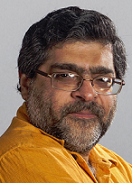
Jonathan H.X. Lee
Titles: Locating Locality in Transnational Religiosity: The Case of Chinese/Taiwanese Women and the Tianhou/Mazu Empress of Heaven Cult
Bio:
Jonathan Lee specializes in Southeast Asian and Sino-Southeast Asian American studies at San Francisco State University. He received his PhD in Religious Studies from the University of California at Santa Barbara in 2009. He is the Program Co-chair of the Asian American religious studies sections for the American Academy of Religion, Western Region (AAR/WR) conference. His work has been published in Peace Review: A Journal of Social Justice; Nidan: International Journal for the Study of Hinduism; Chinese America: History and Perspectives; Empty Vessel: The Journal of the Daoist Arts; Asia Pacific Perspectives; JATI: Journal of Southeast Asian Studies; Journal of International Association of Buddhist Universities; Südostasien [Southeast Asia]; Amerasia Journal, and other journals and anthologies, both nationally and internationally. He is the editor of Cambodian American Experiences: Histories, Communities, Cultures, and Identities (2010); and co-editor with Kathleen M. Nadeau of the Encyclopedia of Asian American Folklore and Folklife (2011) and Asian American Identities and Practices: Folkloric Expressions in Everyday Life (2014). He has published widely on Chinese, Cambodian, Vietnamese, Chinese-Southeast Asian, and Asian American histories, folklore, cultures, and religions.
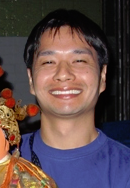
Michael Masatsugu
Titles: Continuous Flow of Gratitude: Buddhist Japanese American Pilgrimages after World War II
Bio:
Michael Masatsugu is Associate Professor of History at Towson University. His research interests are in Asian American history and the history of Buddhist social movements. His work has been published in Amerasia,Journal of Global HistoryandPacific Historical Review. He is currently completing a manuscript, Reorienting the Pure Land: Ethnicity, Transnationalism and Orientalism in the Making of Japanese American Buddhism, 1941-1965, and conducting research on the rise of world Buddhist movements in the early Cold War years.
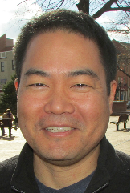
Levi McLaughlin
Titles: Educational Aspiration as Religious Practice in Sōka Gakkai: Case Studies of Pedagogy and Institution-Building in Japan and the United States
Bio:
Levi McLaughlin is Assistant Professor at the Department of Philosophy and Religious Studies, North Carolina State University. He received his Ph.D. in Religion from Princeton University in 2009. His research focuses primarily on religion in modern and contemporary Japan and considers what Japanese religions tell us about the institutions, doctrines, practices, and dispositions that take shape in the contexts of politics, education, and other spheres. Levi is co-author and co-editor of Kōmeitō: Politics and Religion in Japan (Berkeley, CA: Institute of East Asian Studies, 2014), and is completing a book titled Sōka Gakkai: Buddhism and Romantic Heroism in Modern Japan.

Tomoe Moriya
Titles: Japanese Zen in LaSalle, Illinois: The Young D.T. Suzuki and His Encounter with Early 20th Century America
Bio:
Tomoe Moriya is Professor at the Department of International Communication, Hannan University in Osaka, Japan. She specializes in intellectual history of modern Japan, particularly focusing on Japanese Buddhism and its encounter with the West, writing in English and Japanese.Recent works in English include Buddhism in the Americas (co-edited with Duncan RyukenWilliams) and Selected Works of D. T. Suzuki (on comparative religion, co-edited with Jeff Wilson, forthcoming). She edited D. T. Suzuki’s essays on social issues from the 1890s to the 1960s (Zen niikiru) and supervised Japanese translation of Thomas P. Kasulis, Shinto: The Way Home.
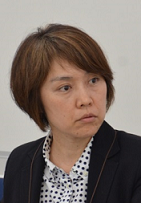
Alexander Soucy
Titles: The Problem of Calling Transnational Buddhism “Ethnic”
Bio:
Alexander Soucy is an Associate Professor at Saint Mary’s University, Halifax, and the Chair of the Department of Religious Studies. He is the author of The Buddha Side: Gender, Power, and Buddhist Practice in Vietnam (2012) and several articles on Vietnamese Buddhism and gender. He also co-edited Wild Geese: Buddhism in Canada (2010) and Flowers on the Rock: Global and Local Buddhisms in Canada (2014), and has published several essays on Buddhism in Canada, particularly relating to Vietnamese Buddhism. Along with John Harding and Victor Hori, he has been active in promoting the study of Buddhism in Canada by organizing conferences and conference panels on the subject. His current research looks at transnational Vietnamese Buddhism and the rising popularity of Zen in Vietnam.
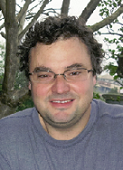
Nancy Stalker
Titles: Cultural Connections: Traditional Arts As Entrée to Japanese New Religious Movements
Bio:
Nancy Stalker is an Associate Professor in the Departments of Asian Studies and History at the University of Texas at Austin. Her specialty is the History of Modern Japan, especially the material and popular culture of the twentieth century. She completed her Ph.D. in 2002 in the Department of History at Stanford University under the supervision of Professor Peter Duus. She is the author of one monograph, Prophet Motive: Deguchi Onisaburō, Oomoto and the Rise of New Religions in Imperial Japan (Hawaii 2008, Japanese version published by Hara Shobo in 2009), and numerous articles in peer reviewed journals. Her second book project, currently in process, is tentatively entitled Budding Fortunes: Ikebana, Industry and Cold War Culture in Twentieth Century Japan. She is also currently editing a volume on Japanese culinary culture entitled Devouring Japan: Interdisciplinary Perspectives on Japanese Gastro-identities, which will be published by Oxford University Press.

Allison Truitt
Titles: Transpacific Crossings: Quan Thế Âm and Journeys to the Pure Land
Bio:
Allison Truitt is Associate Professor in the Anthropology Department at Tulane University in New Orleans. She is author ofDreaming of Money in Ho Chi Minh City(University of Washington 2013) and co-author of an edited collection, Money: Ethnographic Encounters (Berg 2007). Her current project is an ethnographic study of several Vietnamese Buddhist communities in the Gulf South region with an emphasis on how both lay and ordained Buddhists reflect on what is means to be a good Buddhist both in the United States and in Vietnam.
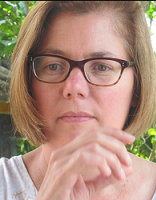
Duncan Williams
Titles: ‘Onward Buddhist Soldiers’: Japanese American Nisei Buddhist Soldiers in the Pacific Theater
Bio:
Duncan Williams is an Associate Professor of Religion and the Director of the USC Shinso Ito Center for Japanese Religions and Culture. He received his Ph.D. from Harvard University and previously held the Shinjo Ito Distinguished Chair of Japanese Buddhism at UC Berkeley and served as the Director of its Center for Japanese Studies. He is the author of a monograph entitled The Other Side of Zen: A Social History of Sôtô Zen Buddhism in Tokugawa Japan (Princeton, 2005) and co-editor of a number of volumes including Issei Buddhism in the Americas (Illinois, 2010), American Buddhism (Routledge, 1998), and Buddhism and Ecology (Harvard, 1997). He has also translated four books from Japanese into English including Putting Buddhism to Work: A New Theory of Economics and Business Management (Kodansha, 1997). He is currently completing a monograph titled, Camp Dharma: Buddhism and the Japanese American Incarceration During World War II (forthcoming, UC Press).

